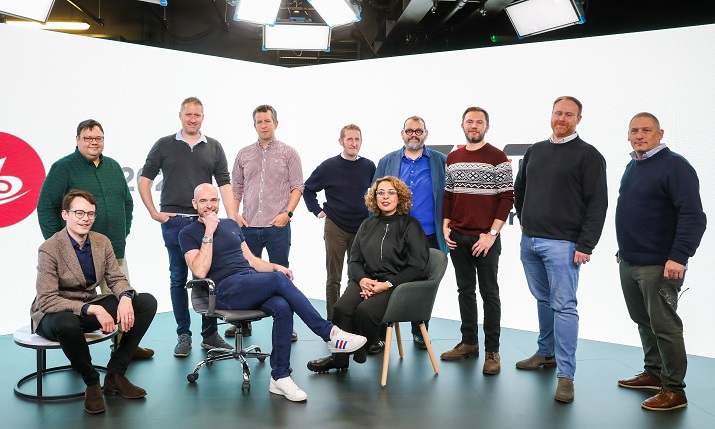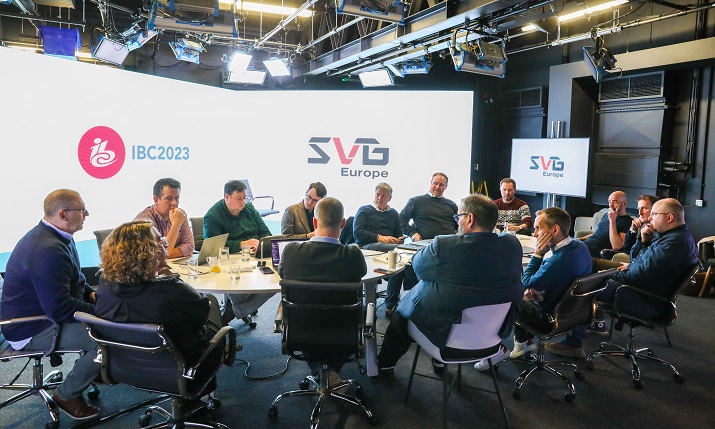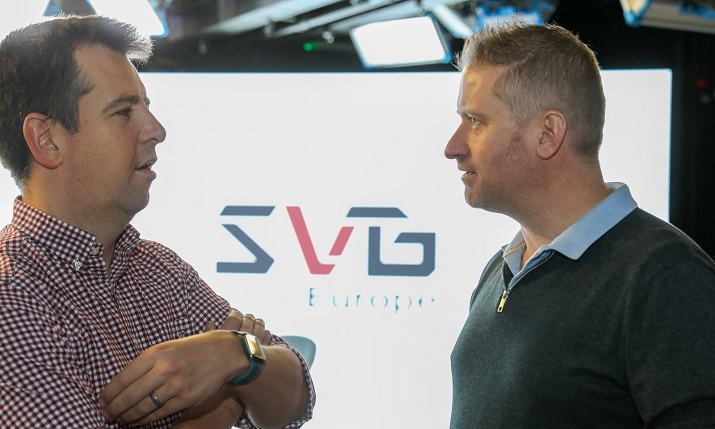Plotting the future of production with the IBC Accelerator Programme
The IBC Accelerator Media Innovation Programme brings together broadcasters and vendors to solve industry issues. This year, SVG Europe is media partner for the sport-focused projects and was present at a roundtable event where ideas for one of this year’s projects were discussed.
The IBC Accelerator Programme has been running since 2019. In that time, the initiative has drawn together some 180 organisations including producers, broadcasters, vendors and suppliers to solve some complex real-world challenges. Last year’s eight Accelerator projects provide a great example of the kinds of business and technology problems that the programme seeks to solve, with projects on live production and sport among the innovative proof of concepts that were demonstrated at IBC in September.
Those who attended last year’s IBC in Amsterdam will have seen demonstrations of Accelerator projects including ‘5G Remote Production (in the middle of nowhere)’, ‘Cloud Based Live Events, Analytics and Low Latency Protocols’ and ‘Volumetric Video for Broadcasting, Metaverse Production and RT3D Assets’.
“The question, is how do we bring the sort of production we enjoy in top tier venues that are well connected, to venues that are poorly connected?”
While each project sought to tackle very different challenges, the overall concept of the IBC Accelerator programme was common to all: challenges defined and developed by media organisations, facilitated and managed by IBC which then paired end users and buyers (known as ‘Champions’) with vendors, manufacturers, suppliers and developers (known as ‘Participants’) who helped design the solutions with the guidance of Champions.
IBC and SVG partnership
Since the programme’s inception, SVG Europe has reported on many of the projects. For the 2023 Accelerator Media Innovation Programme, SVG is delighted to be partnering with IBC to showcase all stages of the sport-focused projects, from conception to development through to the presentation of proof of concepts at IBC 2023 in September.
This began with a roundtable event in December, where a host of senior figures from the broadcast industry gathered at 4Wall’s Studio 19 virtual studio in London to begin the process of considering some potential ideas.

Back row left to right: Gordon Roxburgh, Sky Sports, Andy Beale, BT Sport, Kevin McCue, Sky Sports, Alasdair Kennedy, DAZN, Andy Beach, Microsoft, Richard Crone, Discovery, Jonathan Hale, Discovery, Scott Davis, Microsoft Seated left to right: John Ellerton, BT Media and Broadcast, Matt Stagg, BT Sport, Purminder Gandhu, BBC.
The wide-ranging discussion centred on the use of the cloud, proprietary technology, the evolution of standards, interoperability and control mechanisms in cloud and IP-based environments. With the roundtable taking place at the same time as the latter stages of the Qatar 2022 World Cup, the conversation began with a discussion about the use of data in a live sports environment with Microsoft’s Scott Davis remarking that “video plus data drives a meaningful experience for our customers as well as for us as producers of content”.
From there, the discussion moved to the issue of synchronisation between live data and then to second screen usage and the synching of platforms with multiple devices and then to immersive audio – where the issue of interoperability and proprietary technology was considered.
Kevin McCue, Sky Sports, set the scene. He said: “We’re all lashing stuff together in the cloud, and we’re kind of hoping for technology to catch up to our aspirations, but there hasn’t been a standardised approach to control, monitoring, security and so on, so that you can know that when you put something onto the network it is going to behave itself. We are definitely not there with the cloud, even though it is such a significant part of all of our futures…how do we get vendors to go from proprietary to standard, which they don’t want to do, because they don’t want to give up their IP…I’d say the move to cloud software makes that a lot easier. Because you are no longer buying kit, you buy licences.”
McCue’s colleague at Sky Sports, Gordon Roxburgh, elaborated on the point. He said: “Somebody will come with a great bit of tech and a great idea, and then you’re locked into it. So how do we get to that level of standardisation that we need?”
Encouraging innovation
One of the considerations was ensuring that smaller vendors can feel confident, potentially by developing against an API or a set of standards in order to be part of the same, single ecosystem.
BT Media & Broadcast’s John Ellerton said: “A lot of the things that SMPTE ultimately end up publishing are ‘baked’ somewhere else, such as the VSF. So it tends to be a group of people who identify a problem getting together and thinking, ‘let’s try and solve this and write it all down. Okay, now we’ve identified it, let’s get it turned into something that then becomes standard so that it can’t then be changed,’ that’s the usual approach.”
Discovery’s Richard Crone stressed the importance of not creating an environment in which vendors are discouraged from innovating. He said: “Everyone will have their own special sauce, but at least having everyone working to a common API, platform or common workflow for the cloud, gives all vendors a better chance.”
Crone’s Discovery colleague Jonathan Hale added: “Having some standardisation is absolutely key, to say this is the protocol of the cloud and this is how we want to control you…the challenge today for controlling something in the cloud is that you have to get someone to write a custom driver for it which takes time, because it’s different for every single device.”

Representatives from Microsoft, BT Sport, Discovery, BT Media and Broadcast, BBC, DAZN and Sky Sports ponder the future of production.
The discussion moved on to an exploration of the interplay between what’s in the cloud and what’s on premise, amid efforts to ease the issue of latency, with edge computing raised.
“Can we look at edge-based cloud or private cloud,” asked BT Sport’s Matt Stagg. “Is there an opportunity for us to do the orchestration layer, but have the cloud servers at location, which gives us some quite interesting things that we can share; we can use 5G, but also have fixed cameras and all the orchestration on site. We don’t have to have it built externally, we can actually get people down there, and then if we need, we can turn it off and move it.
“We can fire up this cloud base, but it’s edge cloud. It’s really good for us to move cloud to the edge on prem, but it’s still all software based so you can have something in Azure or in AWS, as well as what you’ve got on site.”
With the discussion taking in the role of 5G and edge computing, a “mega-Accelerator concept” emerged, the crux of which was summarised by BT Sport’s Beale. He said: “The question, is how do we bring the sort of production we enjoy in top tier venues that are well connected, to venues that are poorly connected?
“For this Accelerator, it seems to me we are marching towards looking at software-defined production, with a combination of on-premise edge compute versus cloud, and working out where the split is, with the control and production teams fully remote. As part of the project, we could also constrain the uplink speeds to push the edge compute use case.”
The working title of ‘Connect and Produce Anywhere’ was then agreed, incorporating 5G and remote production, cloud and edge computing, and potentially touching on a roadmap of open standards for protocol interoperability.
“It’s about saying, well, there are challenges to using software in its environment as you do generally spend more time pre and post that event because of the idiosyncrasies of using software,” added Sky Sport’s McCue. “We can explore the interplay between what’s in the cloud and what’s on prem, and that’s what we’re really talking about; we know what the problems are, and we want to overcome some of those blockers by thinking about things differently.”

Sky’s Kevin McCue and BT Sport’s Andy Beale in discussion
The project that was discussed is likely build on the learnings from some of the 2022 Accelerators, in particular the ‘Cloud Based Live Events, Analytics and Low Latency Protocols’ Accelerator project and the ‘5G Remote Production… in the middle of nowhere’ project.
The former set out to demonstrate how live sports events, with multiple camera feeds, can be delivered at scale with full visibility, including live IP signal ingest, standards conversion as well as assessing the potential to introduce low latency protocols, while the latter was itself a continuation of Accelerator programmes over the last two years, with last year’s breakthrough project a showcase for how portable and flexible a private 5G ‘network in a box’ can be for live broadcast production use cases.
The next stage for the 2023 Accelerators was the ‘Kickstart Day’, which took place on 8 February. It provided broadcasters, platforms, studios and key media and technology vendors with the chance to hear pitches – including the project outlined above – from proposed Accelerator projects, with the opportunity for the IBC ecosystem to join projects as either a Champion or a Participant.
“The 2022 Accelerator Programme was a huge success by any measure,” said Mark Smith, who heads the Accelerator Programme for IBC. “This year we’re even better placed, with more awareness and understanding of how the programme works and the value and opportunities it delivers, with a large number of global broadcasters, platforms, studios and key media & technology vendors already keen and committed to making 2023 better than ever.”
For more information on the IBC Accelerator Programme visit ibc.org
